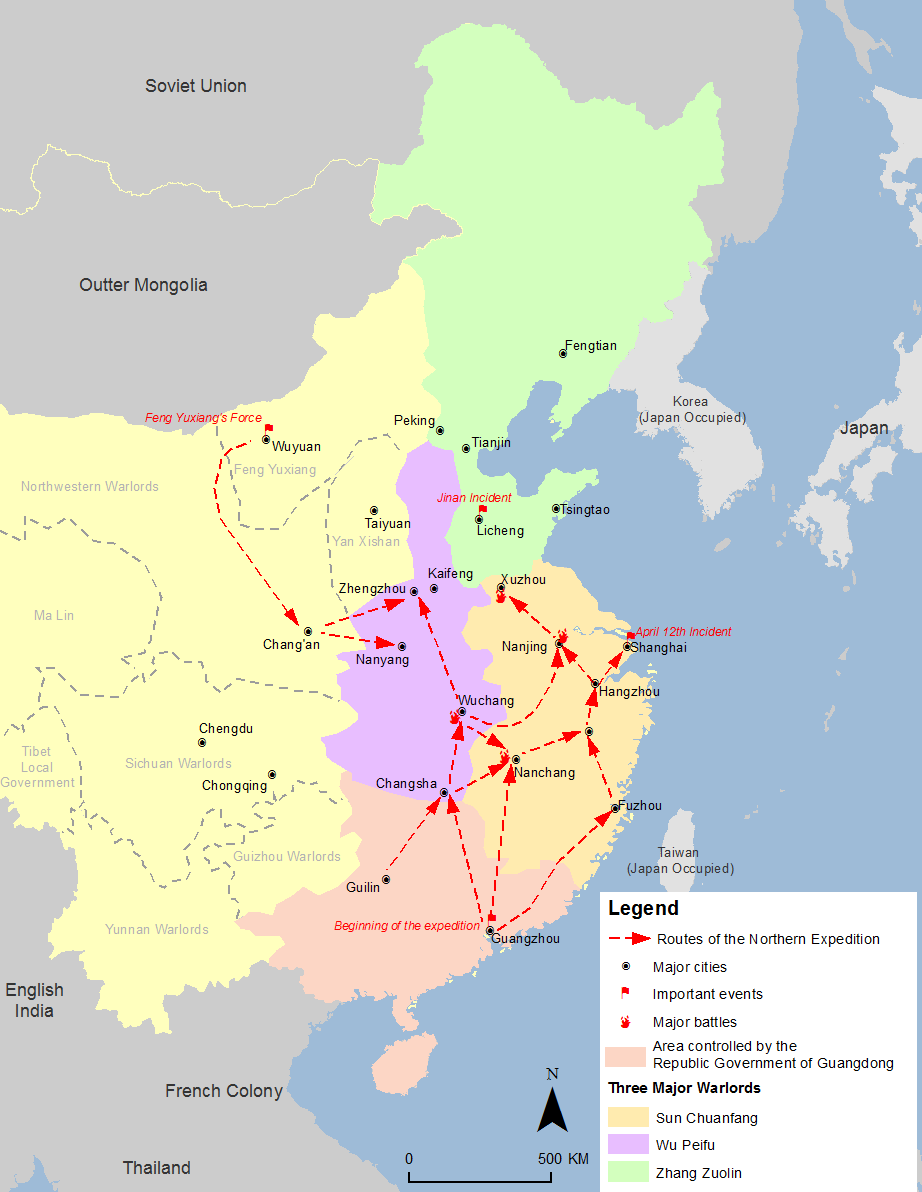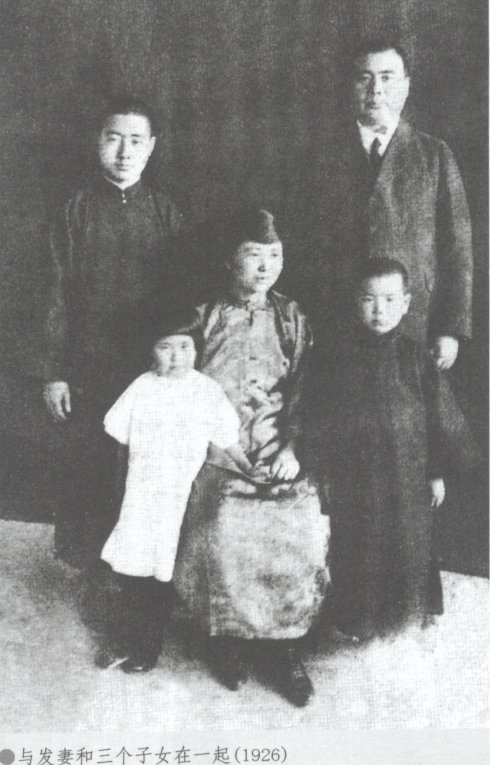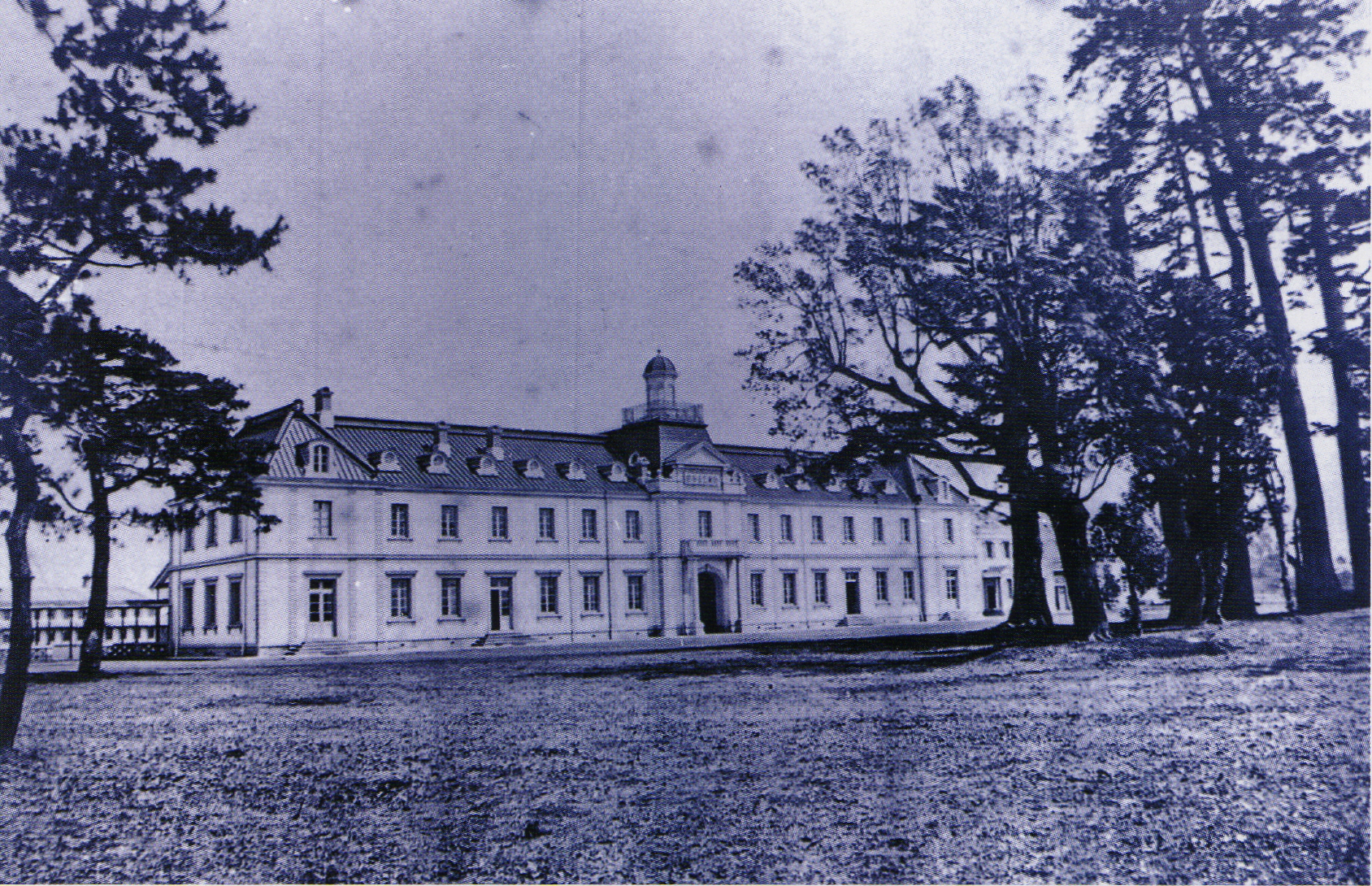|
He Zhuguo
He Zhuguo (; 1897– September 3, 1985) was a China, Chinese general from Rong County, Guangxi, who served in the Fengtian Army and later the National Revolutionary Army. He was a member of the Hakka ethnicity. As a commander of a cavalry force under Zhang Xueliang, he escaped assassination by KMT radicals during the Xi'an Incident by the help of Yang Hucheng. In the People's Republic of China, he is celebrated by the Revolutionary Committee of the Kuomintang for his participation in the Second United Front between the KMT and the Chinese Communist Party against Japanese invaders during the Second Sino-Japanese War. Biography Early life and education He Zhuoguo was born in Yangmei Ruin, Nanxiang, Rong County, Guangxi, and lost his father since childhood. Enrolled in private school at 7 years old. At the age of 10, his mother died. Afterwards, he was supported by his second brother He Zhufan and transferred from a private school to primary school. In 1910, 13-year-old He Zhuguo w ... [...More Info...] [...Related Items...] OR: [Wikipedia] [Google] [Baidu] |
Yulin, Guangxi
Yulin (, ), alternately romanized as Watlam, is one of the fourteen prefecture-level cities of the Guangxi Zhuang Autonomous Region, People's Republic of China. Its Chinese name was changed in 1956 from the historical name "" (), which is homophonous in Standard Mandarin, but different in the local dialect of Yue Chinese; "" is while "" is . The former romanization follows the pronunciation of the historical name in Yue Chinese. Its built-up area is made of two urban districts, and Beiliu City was home to 2,438,467 inhabitants as of 2020 census. Geography and climate Yulin is located in southeastern Guangxi province along the border with Guangdong. It is a hilly basin with a total area of . Yulin's climate is subtropical and monsoonal. Average annual temperatures is 22.9 °C. Yearly precipitation is 1,577 mm. History Artifacts suggest that the area was settled before the Qin dynasty but a commandery by the name of Yulin was not established until early Han dynasty ... [...More Info...] [...Related Items...] OR: [Wikipedia] [Google] [Baidu] |
Zhang Xueliang
Chang Hsüeh-liang (, June 3, 1901 – October 15, 2001), also romanized as Zhang Xueliang, nicknamed the "Young Marshal" (少帥), known in his later life as Peter H. L. Chang, was the effective ruler of Northeast China and much of northern China after the assassination of his father, Zhang Zuolin (the "Old Marshal"), by the Japanese on June 4, 1928. He was an instigator of the 1936 Xi'an Incident, in which Chiang Kai-shek, the leader of China's ruling party, was arrested in order to force him to enter into a truce with the insurgent Chinese Communist Party and form a united front against Japan, which had occupied Manchuria. Chiang agreed, but when he had an opportunity, he seized Chang, who then spent over 50 years under house arrest, first in mainland China and then in Taiwan. Chang is regarded by the Chinese Communist Party as a patriotic hero for his role in the Xi'an Incident. He was also known for having an affair with Edda Mussolini. Biography Early life Chang Hs� ... [...More Info...] [...Related Items...] OR: [Wikipedia] [Google] [Baidu] |
Sun Chuanfang
Sun Chuanfang () (April 17, 1885 – November 13, 1935) a.k.a. the "Nanking Warlord" or leader of the "League of Five Provinces" was a Zhili clique warlord and protégé of the "Jade Marshal" Wu Peifu (1874–1939). Biography Sun Chuanfang was born in Licheng, Shandong Province. Wang Yingkai, a rising officer in the Beiyang Army and protégé of Yuan Shikai, the commander of the Beiyang Army, married Sun's sister, and Sun took advantage of his brother-in-law's position and joined a training camp in 1902. Wang later recommended Sun to Tianjin Military Academy because of the latter's outstanding capabilities; in 1904 he also sent Sun abroad to Japan for more education at the Tokyo Shimbu Gakko, a military preparatory school. Sun eventually graduated from the sixth class of the Imperial Japanese Army Academy and returned to China in 1908. Upon his return from Japan, Wang and his political ally, Tie Liang, happened to be the ones presiding over the examination aimed at testing f ... [...More Info...] [...Related Items...] OR: [Wikipedia] [Google] [Baidu] |
Han Linchun
Han Linchun (; 1885–January 18, 1930), courtesy name Zi Fangchen, was a Chinese general during the Warlord Era affiliated with the Fengtian Clique. As Superintendent of the Mukden Arsenal, he played an important role in modernizing the Fengtian Army after its defeat in the First Zhili-Fengtian War. Early life Han Linchun was born into a rich peasant family living in Liaoyang, a city in southeastern Manchuria. Han did well in school, and left in 1904 to study military science in Japan, where he entered the artillery department of the Imperial Japanese Army Academy. He graduated in 1907. After returning to China, he successively served as a member of the Ordinance Department of the Army Department, the Director of the Ordinance Department, and the Dean of the Army Lecture Hall. After the founding of the Republic of China, Han served in various positions in the Ministry of the Army. In June 1916, he was promoted to be a military advisor. In 1919, he visited Europe as a milit ... [...More Info...] [...Related Items...] OR: [Wikipedia] [Google] [Baidu] |
Jiang Dengxuan
Jiang Dengxuan (; 188025 November 1925), courtesy name Chao Liu () was a Chinese general and politician during the Warlord Era, most famous for his service in Zhang Zuolin's Fengtian Army. Early life and education Jiang was born into a wealthy family of landlords and businessmen. He did well in the early stages of the imperial examination system, but China's defeat in the Boxer Rebellion motivated him to become a soldier. In 1903, he went to Japan to study military science. During this period, he was influenced by early Chinese nationalists Huang Xing and Song Jiaoren, and joined Sun Yat-sen's '' Tongmenghui'' the year it was founded. In 1908, he graduated from the Artillery Department of the Imperial Japanese Army Academy. Career Zhu Qinglan's right-hand man Upon returning to China, he served in a military patrol under Zhu Qinglan in Fengtian province. Zhu appreciated his talent, and took him with him when he was transferred to Sichuan. There, Jiang served as a second ... [...More Info...] [...Related Items...] OR: [Wikipedia] [Google] [Baidu] |
Second Zhili-Fengtian War
The second (symbol: s) is the unit of time in the International System of Units (SI), historically defined as of a day – this factor derived from the division of the day first into 24 hours, then to 60 minutes and finally to 60 seconds each (24 × 60 × 60 = 86400). The current and formal definition in the International System of Units ( SI) is more precise:The second ..is defined by taking the fixed numerical value of the caesium frequency, Δ''ν''Cs, the unperturbed ground-state hyperfine transition frequency of the caesium 133 atom, to be when expressed in the unit Hz, which is equal to s−1. This current definition was adopted in 1967 when it became feasible to define the second based on fundamental properties of nature with caesium clocks. Because the speed of Earth's rotation varies and is slowing ever so slightly, a leap second is added at irregular intervals to civil time to keep clocks in sync with Earth's rotation. Uses Analog clocks and watches often ... [...More Info...] [...Related Items...] OR: [Wikipedia] [Google] [Baidu] |
Feng Yuxiang
Feng Yuxiang (; ; 6 November 1882 – 1 September 1948), courtesy name Huanzhang (焕章), was a warlord and a leader of the Republic of China from Chaohu, Anhui. He served as Vice Premier of the Republic of China from 1928 to 1930. He was also known as the "Christian General" for his zeal to convert his troops and the "Traitorous General" for his penchant to break with the establishment. In 1911 he was an officer in the ranks of Yuan Shikai's Beiyang Army but joined forces with revolutionaries against the Qing dynasty. He rose to high rank within Wu Peifu's Zhili warlord faction but launched the Beijing Coup in 1924 that knocked Zhili out of power and brought Sun Yat-sen to Beijing. He joined the Nationalist Party (KMT), supported the Northern Expedition and became blood brothers with Chiang Kai-shek, but resisted Chiang's consolidation of power in the Central Plains War and broke with him again in resisting Japanese incursions in 1933. He spent his later years supporti ... [...More Info...] [...Related Items...] OR: [Wikipedia] [Google] [Baidu] |
Imperial Japanese Army Academy
The was the principal officer's training school for the Imperial Japanese Army. The programme consisted of a junior course for graduates of local army cadet schools and for those who had completed four years of middle school, and a senior course for officer candidates. History and background Established as the ''Heigakkō'' in 1868 in Kyoto, the officer training school was renamed the Imperial Japanese Army Academy in 1874 and relocated to Ichigaya, Tokyo. After 1898, the Academy came under the supervision of the Army Education Administration. In 1937 the Academy was divided, with the Senior Course Academy being relocated to Sagamihara in Kanagawa prefecture, and the Junior Course School moved to Asaka, Saitama. The 50th graduation ceremony was held in the new Academy buildings in Sagamihara on 20 December 1937, and was attended by the Shōwa Emperor (Emperor Hirohito) himself. In 1938, a separate school was established for military aviation officers. During World War II, the sc ... [...More Info...] [...Related Items...] OR: [Wikipedia] [Google] [Baidu] |
Baoding Military Academy
Baoding Military Academy or Paoting Military Academy () was a military academy based in Baoding, during the late Qing dynasty and early Republic of China, in the first two decades of the 20th century. For a time, it was the most important military academy in China, and its cadets played prominent roles in the political and military history of the Republic of China. The Baoding Military Academy closed in 1923, but served as a model for the Whampoa Military Academy, which was founded in Guangzhou in 1924. It, along with the Yunnan Military Academy and the Whampoa Military Academy, was one of the “three major strategist cradles in modern China”. During the Second Sino-Japanese War, half of 300 divisions in China's armed forces were commanded by Whampoa graduates and one-third were Baoding cadets. Predecessors In 1885 Li Hongzhang founded the Tianjin Military Academy 天津武備學堂 for Chinese army officers, with German advisers, as part of his military reforms. The move was su ... [...More Info...] [...Related Items...] OR: [Wikipedia] [Google] [Baidu] |
Chinese Communist Party
The Chinese Communist Party (CCP), officially the Communist Party of China (CPC), is the founding and One-party state, sole ruling party of the China, People's Republic of China (PRC). Under the leadership of Mao Zedong, the CCP emerged victorious in the Chinese Civil War against the Kuomintang, and, in 1949, Mao Proclamation of the People's Republic of China, proclaimed the establishment of the People's Republic of China. Since then, the CCP has governed China with List of political parties in China, eight smaller parties within its United Front (China), United Front and has sole control over the People's Liberation Army (PLA). Each successive leader of the CCP has added their own theories to the Constitution of the Chinese Communist Party, party's constitution, which outlines the ideological beliefs of the party, collectively referred to as socialism with Chinese characteristics. As of 2022, the CCP has more than 96 million members, making it the List of largest political parties ... [...More Info...] [...Related Items...] OR: [Wikipedia] [Google] [Baidu] |
Second United Front
The Second United Front ( zh, t=第二次國共合作 , s=第二次国共合作 , first=t ) was the alliance between the ruling Kuomintang (KMT) and the Chinese Communist Party (CCP) to resist the Japanese invasion of China during the Second Sino-Japanese War, which suspended the Chinese Civil War from 1937 to 1945. Background In 1927 the Chinese Communists retaliated against Kuomintang following a betrayal of its members in Shanghai by National Revolutionary Army commander Chiang Kai-shek, which marked the end of the KMT's four-year alliance with the Soviet Union and its cooperation with the CCP during the Northern Expedition (aka First United Front) to defeat warlords and unify China. In 1931 the Japanese launched its invasion and subsequent occupation of Manchuria. Chiang Kai-shek, who ''de facto'' led the central government of China, decided that China must avoid all-out war with Japan due to domestic turmoil and inadequate preparation. Therefore, he "pursued a stra ... [...More Info...] [...Related Items...] OR: [Wikipedia] [Google] [Baidu] |






